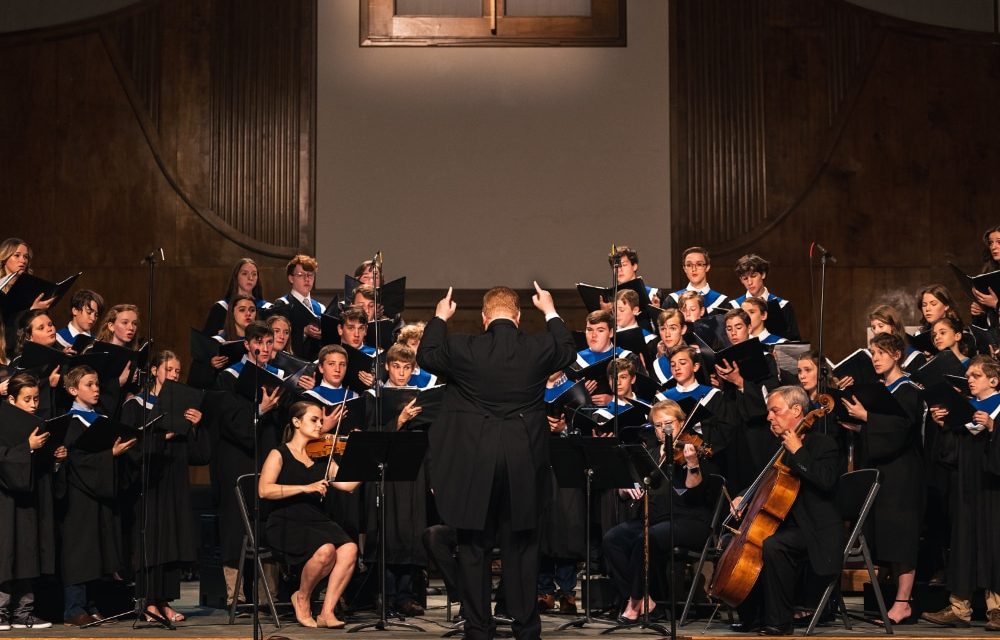What If I Don’t Like Bach?
How to Develop a Taste for Better Music
By Jarrod Richey
“How do you get someone to love Johann Sebastian Bach when they would rather listen to Taylor Swift?” The question came from a music colleague, but it could just as easily have been posed by the parent of one of my students. It was also serious and not meant as a swipe at Swift.
After thinking for a second, I posed questions back to her as a start to an answer—questions that parents can also ask themselves as they think about the music that’s played in their homes:
What if you could listen to music that would reveal, in both its substance and form, more of the character of God? What if more complex music, like a multitude of colors, moves you along toward a deeper understanding of music and art and the glory of God? Why would you not want to pursue that kind of music as much as was reasonably possible?
That’s what good music—particularly music from faithful artisans like Bach—does. Unfortunately, much of his magnificence is lost on modern listeners because they have a much simpler musical palate: We have become accustomed to baby food when there’s a glorious feast to be had. But it doesn’t have to be this way, and you can do something about it.
1. Realize that your tastes and desires are weak.
Part of the reason why many people have trouble listening to classical music is that they haven’t cultivated a taste for good music. It’s similar to cultivating a taste for good coffee—it takes work to find the flavors interesting, and it often doesn’t seem necessary when something easier is readily available. Like a can of soda, a pop song is instantly accessible.
This is where the great C.S. Lewis provides some helpful clarification. He writes, “We are half-hearted creatures, fooling about with drink and sex and ambition when infinite joy is offered us, like an ignorant child who wants to go on making mud pies in a slum because he cannot imagine what is meant by the offer of a holiday at the sea. We are far too easily pleased.”1 According to Lewis, we don’t want better things because our loves and desires are too weak for them. We are too easily pleased with the “mud pies” of the music industry, allowing them to fill our playlists, homes, and cars.
At the same time, we don’t like to acknowledge that this sort of diet affects our heath—or the health of our children. We want to fill our bellies with a pounding beat and kitschy lyrics and then pretend that we are well fed. We don’t understand that what we consume in our music is shaping us for better or worse and that we need to be willing to mature our loves and our understanding.
2. Decide that you want to strengthen them.
When it comes to changing our loves and desires, Lewis again has the proper perspective. In Abolition of Man, he writes, “The task of the modern educator is not to cut down jungles but to irrigate deserts.”2 This is one of the great tasks of classical Christian schools: to create students who not only know what is good, but want it. Your children’s teachers are working hard to irrigate their “deserts,” and you can join them in this effort. If your family playlists seem dry, decide that you’re going to water them with richer, deeper music.
If you read this article too hastily, you might think I want everyone to stop listening to Taylor Swift. I have no desire to cut her down. Instead, I would rather spend my time and energy in giving students and parents the ability to understand and appreciate the music of composers like Bach. My “day job” is focused on just that—giving people music literacy so they can be faithful worshippers who enjoy the vast riches of music and song all their days. The better my students understand Bach, the more engaged they are in whatever genre of music enters their ears.
3. Find a great composer—like Bach—and work to develop a taste for his music.
Bach scholars have had a great time unpacking the rich meaning nested under the surface of his compositional craft. They have found places where Bach signed his name within his works using pitches in succession (B♭-A-C-B♮–in German, the B natural was referred to as “H”). They have seen how the entrances of the various voice parts make visual shapes on the printed page, further emphasizing the meaning of the work as a whole. They have seen how the string section makes an audible circular halo effect over the words of Jesus.
Although audiences over the years might not have all caught on to everything that Bach was doing, he clearly did it Soli Deo Gloria (“for the glory of God alone”), writing “S.D.G.” on his printed scores. He wrote for a different audience—an audience of One.
The reason that I’ve focused on Bach specifically is not to insist that he’s the only composer that matters—it’s more about what he represents. A composer like Bach is not writing for surface-level enjoyment. He crafts his music with multiple layers of meaning, pointing to the glories of our wonderful God in a beautiful tapestry of chords and cadences. He engages the mind as much as the heart, and, in contrast to many modern forms of worship, his music conceals the message rather than putting it on the surface. Bach’s compositions are meant to be visited again and again, much like the parables of Jesus or an excellent poem.
How did he accomplish this? Bach used music to mirror the narrative and style of the Scriptures. He was so steeped in the Bible that the layers of meaning poured naturally into his compositions. We don’t like Bach simply because he was a Christian and wrote sacred music, but because he mastered both his craft and his Christian duty to know God’s Word and united the two in his music.
Conclusion
I’ve never heard someone say, “I wish I hadn’t developed a taste for Handel’s Messiah.” As parents who are tasked with raising children—and with shaping our own loves and affections—we should take a good look at the music that we play in our homes. Why would we not want to understand more of the character of God through the music of Bach and others like him? Why would we not seek to mature out of the “weak loves” that keep us from wanting what is better when it comes to music—and from leading our children to want those things as well?
1 Lewis, C. S.. The Weight of Glory. United States: HarperCollins, 2001, 26.
2 Lewis, C. S.. The Abolition of Man. United States: HarperCollins, 2009, 9.
…….

Jarrod Richey
teaches music at Geneva Academy in West Monroe, LA, runs the Chenaniah Summer Music Institute, and serves as Academic Dean for the Redeemer School of the Arts. He is also the general editor of Let Joy Resound!: A Singing School Hymnal (2024). You can subscribe to his Substack at jarrodrichey.substack.com.










